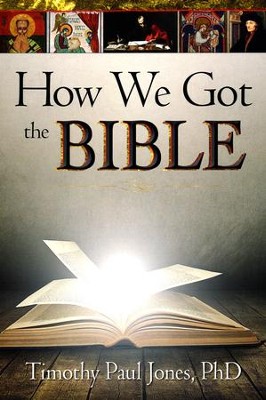Throughout my childhood, I was presented with a number of opportunities to examine the faith of my parents and the church that we attended. However, most of these opportunities were fairly black and white with challenges coming from folks who were generally antagonistic to Christianity. It wasn't until I attended a Christian university that my New Testament professor introduced me to the world of textual criticism and Bart Ehrman. In spite of his profession of faith and role as a pastor at a local church, that man seemed to do everything he could to undermine the Bible. I was unprepared to refute the claims I encountered, but I didn't thoughtlessly embrace the man's teaching or that of the books he was promoting. God faithfully brought me through that rocky season and used it to strengthen my faith. Over the years, I've continued to study the subject a bit, and I've sought to equip my kids to face "the real world" with a strong, biblical foundation. I want them to examine their beliefs and the beliefs of others and to think critically about them all. When it comes to considering the claims made about Scripture, Timothy Paul Jones has given us an excellent primer in How We Got the Bible.
According to Dr. Jones, the "purpose of this book is to deepen your trust in the
Bible by helping you understand how God's written revelation made the journey
from the mind of God to the sixty-six texts in your Bible today". In seven concise chapters, Jones explains what the Bible is, how the Old and New Testaments were composed and answers many questions, including:
- What's so special about the Bible?
- Is it different from other books?
- Is it reliable?
- What does it mean that it is inspired and inerrant?
- Do Christians need the Old Testament?
- How was the Bible collected and arranged?
- Which books belong in the Bible?
- Why do some Christian religious groups include additional books (like the Apocrypha) in their Bibles?
- Why don't we continue adding books to the Bible today?
- How did early Christians recognize which texts truly were God's Word and choose to receive them?
- Did early Christians care whether the events described in the New Testament really happened or whether the books were written by the authors who claimed to write them?
- How can the Bible be without error if the copyists made mistakes?
- How do archaeological discoveries such as the 1947 discovery of the Dead Sea Scrolls serve to confirm the accuracy of the Bible and result in increasingly accurate translations?
Throughout How We Got the Bible, Jones is faithful to the Bible. He utilizes relevant anecdotes and humor to keep his presentation engaging and relates many historical accounts to show the continuing importance of this subject today. He includes numerous visual aids such as colorful paintings, photographs, and charts that are sure to benefit the reader. Jones reminds us of the privilege of having God's Word in our language and concludes his work with a challenge explaining the work that remains for the 1,800 people groups who do not yet have a Bible translation in their language. I recommend this work for any group or individual who desires a gentle introduction to the means through which God has been faithful to bring His Word to us.
*Many thanks to Rose Publishing for a complimentary ebook copy of How We Got the Bible in exchange for my honest opinion!

No comments:
Post a Comment